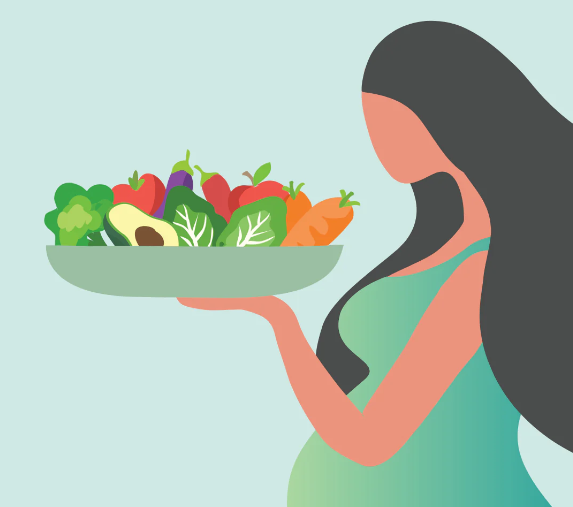What to eat and what not to eat in pregnancy (Pregnancy Diet Plan): The Diet plan for pregnant women matters the most in pregnancy, in such a situation it is very important to get proper nutrition. Her proper nutrition helps in the development of her baby. In such a situation, he needs 2000 calories in a day. He needs the right amount of fruits, vegetables, carbohydrates (pasta and potatoes) and proteins. That’s why his diet plays a very important role. But also keep in mind that do not eat too much food, it can cause you many problems.

Diet Plan for Pregnant Women with Diabetes: Managing Blood Sugar for a Healthy Pregnancy
Pregnancy is a beautiful journey, but it also comes with its challenges, especially for women with diabetes. Managing blood sugar levels becomes crucial during this time to ensure a healthy pregnancy and reduce the risk of complications for both the mother and the baby. A well-balanced diet tailored to the needs of pregnant women with diabetes plays a key role in achieving this goal. In this comprehensive guide, we’ll outline a detailed diet plan designed specifically for pregnant women with diabetes, covering meal ideas, portion sizes, and important nutritional considerations.
Understanding Gestational Diabetes:
Gestational diabetes mellitus (GDM) is a type of diabetes that develops during pregnancy. It occurs when the body is unable to produce enough insulin to meet the increased demands of pregnancy, leading to elevated blood sugar levels. While GDM usually resolves after childbirth, it can have serious implications if not managed properly during pregnancy. Complications may include macrosomia (large birth weight), preterm birth, and an increased risk of developing type 2 diabetes later in life.
Key Principles of a Diabetes-Friendly Diet Plan:
- Carbohydrate Control: Managing carbohydrate intake is crucial for controlling blood sugar levels in women with diabetes. Focus on consuming complex carbohydrates with a low glycemic index (GI) to prevent rapid spikes in blood sugar. Choose whole grains, legumes, fruits, and vegetables over refined carbohydrates and sugary snacks.
- Balanced Meals: Aim for balanced meals that include a combination of carbohydrates, protein, and healthy fats. This helps stabilize blood sugar levels and provides essential nutrients for both the mother and the baby. Include sources of lean protein such as poultry, fish, tofu, and legumes in every meal.
- Frequent, Small Meals: Eating smaller, more frequent meals throughout the day can help regulate blood sugar levels and prevent excessive spikes or drops. Aim for three main meals and two to three snacks spaced evenly throughout the day.
- Portion Control: Pay attention to portion sizes to avoid overeating and maintain stable blood sugar levels. Use measuring cups, spoons, or food scales to accurately portion out foods, especially carbohydrates.
- Healthy Snacking: Choose nutritious snacks that provide sustained energy without causing drastic fluctuations in blood sugar levels. Opt for options such as Greek yoghurt with berries, raw vegetables with hummus, nuts, or whole-grain crackers with cheese.
Sample Diabetes-Friendly Meal Plan:
Here’s a sample meal plan for pregnant women with diabetes, spread over three meals and three snacks:
Breakfast:
- 1 whole-grain English muffin with scrambled eggs and spinach
- 1 small apple
- 1 cup unsweetened almond milk
Mid-Morning Snack:
- 1 small handful of almonds
- 1 medium orange
Lunch:
- Grilled chicken salad with mixed greens, cherry tomatoes, cucumbers, and avocado
- Whole grain roll
- 1 small serving of mixed berries
Afternoon Snack:
- Carrot sticks with hummus
- 1 hard-boiled egg
Dinner:
- Baked salmon with quinoa and roasted vegetables (broccoli, bell peppers, and zucchini)
- Side salad with balsamic vinaigrette dressing
Evening Snack:
- Greek yoghurt with sliced strawberries
- 1 tablespoon of chia seeds
Important Nutritional Considerations:
- Folate and Iron: Pregnant women with diabetes have increased nutrient needs, particularly for folate and iron. Ensure adequate intake of foods rich in these nutrients, such as leafy green vegetables, fortified cereals, lean meats, and legumes.
- Hydration: Stay well-hydrated by drinking plenty of water throughout the day. Aim for at least 8-10 glasses of water daily to support overall health and proper fetal development.
- Supplementation: In some cases, prenatal vitamins and mineral supplements may be recommended to ensure adequate intake of essential nutrients during pregnancy. Consult with your healthcare provider to determine the appropriate supplements for your needs.
- Monitoring Blood Sugar Levels: Regular monitoring of blood sugar levels is essential for pregnant women with diabetes. Follow your healthcare provider’s recommendations for testing frequency and target ranges to maintain optimal glycemic control.

Diet plan for pregnant women
| dairy products | Milk (full cream, toned, skimmed, low-fat), curd, butter, cheese/paneer, cream, custard, ice cream |
| whole grains | Oatmeal, Popcorn, Millet, Quinoa, Brown Rice, Rye, Rice, Wheat Berry |
| legume | Peanuts, peas, lentils etc. |
| Vitamin B12 | Vitamin B12 is also found in red vegetables like potatoes, white vegetables, mushrooms, milk and milk products. |
| Iron | Baby spinach, butter lettuce, broccoli, beans, green peas, beetroot |
| Nuts | Cashews, Almonds, Walnuts, Pistachios, Peanuts |
what not to eat during pregnancy
What to eat and what not to eat in pregnancy (Pregnancy Diet Plan): Women should keep in mind that during pregnancy, no substance should be eaten without any information, it can have bad effects on the child’s health, women should not eat during pregnancy. Do not consume high-calorie items, packaged food, alcohol, excessive caffeine, raw fish, or raw eggs at all.
Which fruits to eat during pregnancy
What to eat and what not to eat in pregnancy (Pregnancy Diet Plan): Pregnant women should eat high-fibre fruits such as apples, pears, oranges, guavas, berries, peaches, and berries at this time, it maintains blood sugar and energy.
Which fruits should not be eaten during pregnancy?
What to eat and what not to eat in pregnancy (Pregnancy Diet Plan): In this situation, you do not have to eat grapes, raw papaya, pineapple and banana at all. It is not very harmful to you, but it is not very beneficial either. Even if you have eaten them, it does not matter, but you should not eat them intentionally.
Conclusion:
A well-planned diet plays a crucial role in managing diabetes during pregnancy and promoting a healthy outcome for both the mother and the baby. By following a balanced meal plan tailored to their nutritional needs, pregnant women with diabetes can effectively manage blood sugar levels and reduce the risk of complications. However, it’s important to consult with a healthcare provider or registered dietitian before making any significant dietary changes to ensure individualized care and support throughout the pregnancy journey.
How to keep calm in every situation
